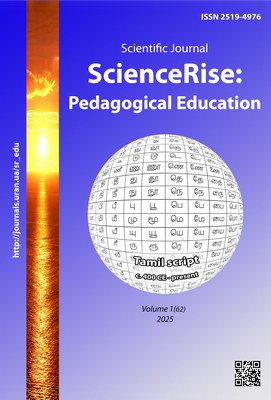Multicultural education as an integral component of higher education in Germany
DOI:
https://doi.org/10.15587/2519-4984.2025.325715Keywords:
multicultural education, Germany, students, higher education institutions, educational program, basic module, additional module, focus moduleAbstract
In connection with globalization processes, understanding multiculturalism is becoming increasingly relevant, as there are many opportunities for academic mobility for both students and teachers. In order to develop multicultural education in Ukraine, we should study the experience of developed countries of the world. One of such countries is Germany, which is among the five countries with the largest number of foreign students. The author analyzed the websites of higher education institutions in Germany and found that many higher educational establishments offer educational programs, aimed at training specialists in multicultural education (Intercultural Communication and Education (University of Cologne), Multilingualism and Education (University of Hamburg), etc.). The features of the educational program of the University of Cologne are highlighted, the graduates of which can work with problems of social transformation. It is established that the educational program contains basic, thematic, and additional modules. The basic courses include “Language and Ethnology”, “Migration and Diversity”, “Language and Communication”, “Multicultural Education”, and “Social Psychology”; the module of focus disciplines is selective and is designed to ensure the individual educational trajectory of students. Students must choose four courses out of twelve (“Construction of Cultural Identity”, “Anthropology of Globalization”, “Mobility and Citizenship”, “Media and Intercultural Communication”, “Multilingualism in Modern Society”, “Second Language”, “Diagnostics in Conditions of Multilingualism”, etc.). Additional modules are aimed either at deepening the basic modules, or involve internships, language courses or passing colloquiums. The main content of each academic discipline is revealed. Ways of creative use of Germany’s experience in the educational space of Ukraine are suggested (creation of relevant educational programs or implementation of selective courses)
References
- Kruhlenko, L. V. (2021). Polycultural education: world concepts of the second half of the XX century. Innovate Pedagogy, 36, 21–26. https://doi.org/10.32843/2663-6085/2021/36.3
- Bezukh, Yu. S. (2016). The evolution of multicultural education in Ukraine. Young Scientist, 4.1 (31.1), 24–27.
- Halitsan, O. A., Koicheva, T. I., Osypova, T. Yu. (2022). Multicultural education in the professional training of future teachers. Innovate Pedagogy, 1(43), 87–91. https://doi.org/10.32843/2663-6085/2022/43/1.17
- Lesnianska-Doshchak, A. (2017).The development of multicultural education in France (at the end of the ХХ – the beggining of the ХХІ century). Molod i rynok, 9, 179–184. Available at: http://nbuv.gov.ua/UJRN/Mir_2017_9_34
- Bildung, Kultur und Anthropologie. Friedrich-Schiller-Universität Jena. Available at: https://www.studis-online.de/studium/bildung-kultur-und-anthropologie/uni-jena-9950/
- Basismodul zum Anwendungsfach III- Organisations- und Angewandte Sozialpsychologie. Universität Bielefeld. Available at: https://ekvv.uni-bielefeld.de/sinfo/publ/modul/26800925
- Interkulturelle Kommunikation und Bildung, Master of Arts (M.A.). Fakultät der Universität zu Köln. Available at: https://studienorientierung.uni-koeln.de/studienangebot/index_ger.html?app=true&id=223
- Modulhandbuch interculturelle kommunikation und building (2022). Master of Art. Fakultät der Universität zu Köln. Available at: https://hf-studium.uni-koeln.de/sites/hf-studium/user_upload/Modulhandbuecher_MHB/MHB_Fstg_M.A_M.Sc/M.A._Interkulturelle_Kommunikation_Bildung_1-Fach/UzK_HF_MA_IKB_1_Fach_MHB_20220711.pdf
- Lehrplanstudie Migration und Integration. Fakultät der Universität zu Köln. Available at: https://www.integrationsbeauftragte.de/resource/blob/1872554/1880068/ac5c24feeb05c909033fb65c6de1919e/lehrplanstudie-data.pdf
- Haider, H. (2014). Modulhandbuch. Interkulturelle Kommunikation und Bildung. Universität zu Köln, 47. Available at: https://www.hf.uni-koeln.de/data/hflehrestudium/File/Modellakkreditierung/Cluster_16/MHB/MHB_MA_IKB.pdf
- Interkulturelle Bildung, Migration und Mehrsprachigkeit. Pädagogische Hochschule Karlsruhe. Available at: https://www.studis-online.de/studium/interkulturelle-bildung/ph-karlsruhe-9547/
- Interkulturelle Kommunikation Studium. Fakultät der Universität zu Köln. Available at: https://www.studycheck.de/studium/interkulturelle-kommunikation
Downloads
Published
How to Cite
Issue
Section
License
Copyright (c) 2025 Maryna Kryvko

This work is licensed under a Creative Commons Attribution 4.0 International License.
Our journal abides by the Creative Commons CC BY copyright rights and permissions for open access journals.
Authors, who are published in this journal, agree to the following conditions:
1. The authors reserve the right to authorship of the work and pass the first publication right of this work to the journal under the terms of a Creative Commons CC BY, which allows others to freely distribute the published research with the obligatory reference to the authors of the original work and the first publication of the work in this journal.
2. The authors have the right to conclude separate supplement agreements that relate to non-exclusive work distribution in the form in which it has been published by the journal (for example, to upload the work to the online storage of the journal or publish it as part of a monograph), provided that the reference to the first publication of the work in this journal is included.







